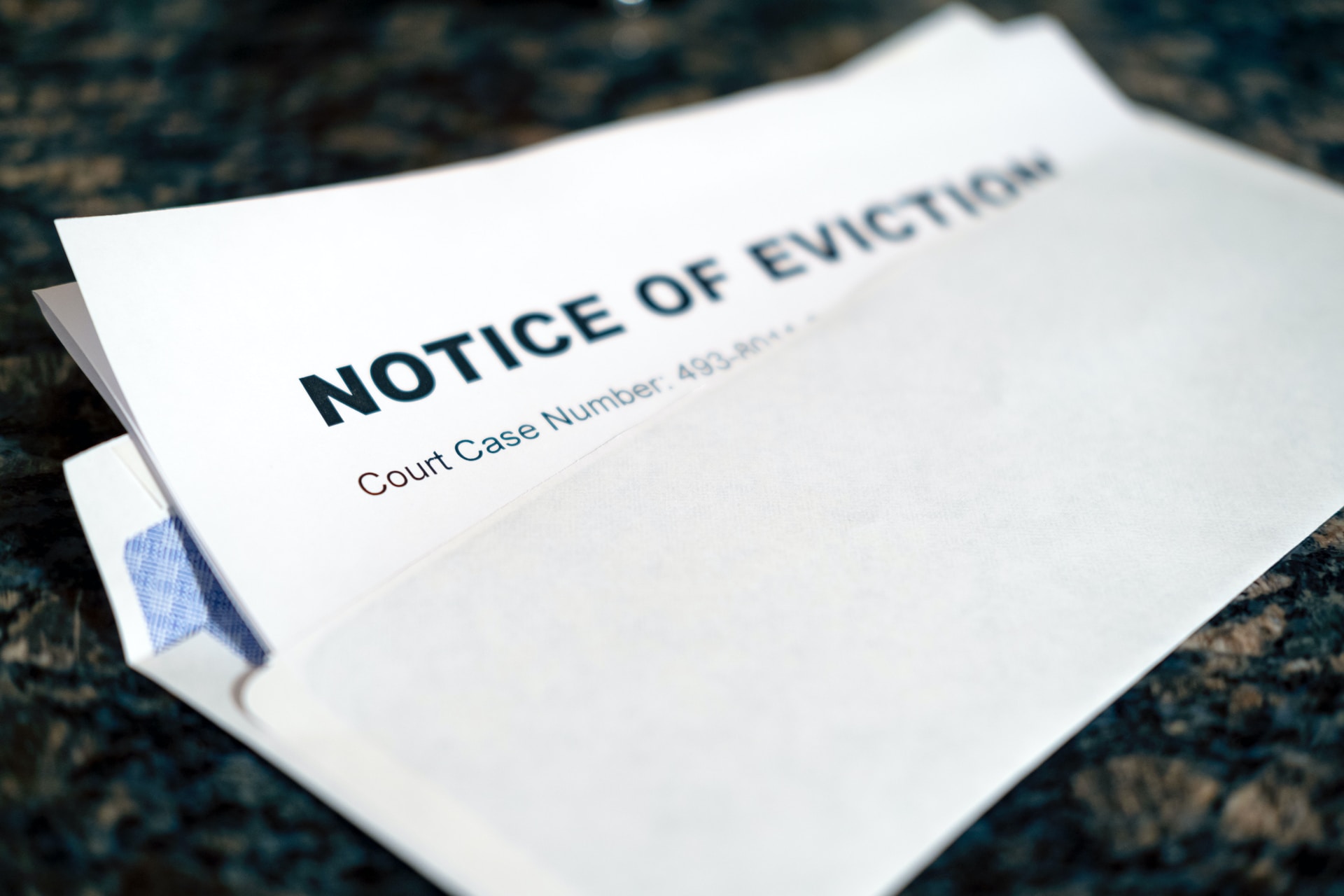

Finance
How To Get An Eviction Off Your Credit
Modified: March 1, 2024
Learn how to remove an eviction from your credit and improve your financial standing. Expert tips and advice to help you overcome this hurdle.
(Many of the links in this article redirect to a specific reviewed product. Your purchase of these products through affiliate links helps to generate commission for LiveWell, at no extra cost. Learn more)
Table of Contents
- Introduction
- Understanding the Impact of Evictions on Credit
- Step 1: Review Your Credit Report
- Step 2: Contest Any Errors or Inaccuracies
- Step 3: Negotiate with Your Landlord or Collection Agency
- Step 4: Settle or Pay Off the Debt
- Step 5: Seek Legal Assistance if Needed
- Step 6: Rebuild Your Credit
- Conclusion
Introduction
Dealing with an eviction can be a stressful and challenging experience. Not only does it disrupt your living situation and stability, but it can also have a significant impact on your credit. When an eviction appears on your credit report, it can lower your credit score and make it more difficult to secure housing or obtain credit in the future.
However, it’s important to remember that there are steps you can take to mitigate the damage and eventually get an eviction off your credit. In this article, we will guide you through a comprehensive process to help you navigate the challenges of having an eviction on your credit report. By following these steps, you can improve your creditworthiness and regain financial stability.
It’s crucial to stay proactive and take control of your credit situation. While it may take time and effort, the rewards of removing an eviction from your credit report are well worth it. Let’s dive into the step-by-step process of getting an eviction off your credit and rebuilding your financial reputation.
Understanding the Impact of Evictions on Credit
Before delving into the steps to remove an eviction from your credit, it’s important to understand the impact it can have on your financial health. When a landlord or property management company evicts you, they may report the eviction to the credit bureaus. This information is then reflected on your credit report and can have severe consequences.
An eviction on your credit report can significantly lower your credit score. Payment history is one of the most significant factors in determining your credit score, and an eviction is a clear sign that you have not fulfilled your financial obligations. This negative mark can stay on your credit report for up to seven years, making it difficult for you to obtain favorable terms on loans, secure housing, or even land certain job opportunities.
In addition to the negative impact on your credit score, an eviction can also raise red flags for future landlords and property managers. Many housing providers check applicants’ credit reports to assess their reliability and ability to pay rent. Having an eviction on your record can make it challenging to find a new place to live, as landlords may view you as a high-risk tenant.
It’s crucial to address the issue of an eviction on your credit report promptly. By taking proactive steps to resolve the situation, you can begin the process of rebuilding your credit and improving your financial standing. Let’s now explore the steps you can take to remove an eviction from your credit report.
Step 1: Review Your Credit Report
The first step in getting an eviction off your credit report is to thoroughly review your credit report. You can obtain a free copy of your credit report from each of the three major credit bureaus – Equifax, Experian, and TransUnion – once a year through AnnualCreditReport.com.
Once you have your credit reports in hand, carefully examine them for any entries related to the eviction. Look for details such as the date of the eviction, the amount owed, and the status of the account (e.g., past due, collections). Make note of any inaccuracies or errors you come across.
If you notice any incorrect information, such as a mistaken eviction notation or incorrect dates, it’s crucial to dispute these errors with the credit bureaus. You can do this by sending a formal dispute letter, including supporting documentation and requesting that the incorrect information be removed or corrected.
It’s also important to examine other aspects of your credit report, such as outstanding debts, late payments, and other negative marks. Understanding your overall credit situation will help you develop a comprehensive plan to address your credit challenges.
By reviewing your credit report, you gain a clear understanding of the specific details related to the eviction and any other negative information on your report. This step sets the foundation for the subsequent steps in the process of removing the eviction and improving your overall creditworthiness.
Step 2: Contest Any Errors or Inaccuracies
Once you have thoroughly reviewed your credit report and identified any errors or inaccuracies related to the eviction, it’s time to take action and contest these items. Disputing inaccurate information is crucial to ensuring the accuracy and fairness of your credit report.
To begin the dispute process, you can either submit a dispute online through the credit bureau’s website or send a written dispute letter. When filing a dispute, provide clear and specific details about the inaccurate information, including why you believe it is incorrect and any supporting documentation you have.
The credit bureaus are required to investigate your dispute within 30-45 days and notify you of the results. If they find that the information is indeed incorrect, they must remove or correct it on your credit report. Keep records of all communication and copies of any supporting documents throughout this process.
It’s important to be persistent and follow up regularly on your dispute. If the credit bureaus fail to respond within the designated timeframe or fail to remove the inaccurate information, you may need to escalate your dispute by contacting the Consumer Financial Protection Bureau (CFPB) or seeking legal assistance.
By contesting errors or inaccuracies, you are taking an active role in ensuring the accuracy of your credit report. Resolving these disputes can potentially remove negative marks, such as the eviction, from your credit history and improve your overall creditworthiness.
Step 3: Negotiate with Your Landlord or Collection Agency
After reviewing your credit report and addressing any errors or inaccuracies, it’s time to directly engage with your landlord or the collection agency that reported the eviction. Open communication and negotiation can help you reach an agreement that may result in the removal or update of the eviction from your credit report.
Start by reaching out to your landlord or the collection agency in a respectful and professional manner. Explain your desire to resolve the issue and express your willingness to work out a mutually beneficial solution. Be prepared to provide any relevant information or documentation that supports your case.
When negotiating, consider proposing options such as:
- Payment in full: If you have the financial means, offering to pay the outstanding amount in full can demonstrate your commitment to resolving the situation.
- Payment plan: If paying in full is not feasible, propose a payment plan that allows you to gradually repay the debt over time. Make sure the terms are realistic and manageable for your current financial situation.
- Settlement: In some cases, you may be able to negotiate a settlement for a lesser amount than what is owed. This option can be beneficial for both parties, as it allows you to resolve the debt while alleviating some of the financial burden.
During the negotiation process, it’s important to keep a record of all correspondence, including emails and phone calls. If you reach an agreement with your landlord or collection agency, ensure that you have a written agreement detailing the terms of the settlement or any updated information regarding the eviction.
Remember, successful negotiation requires patience and persistence. Keep in mind that the primary goal is to reach a resolution that benefits both parties and helps remove the eviction from your credit report.
Step 4: Settle or Pay Off the Debt
Once you have negotiated with your landlord or collection agency and reached an agreement, it’s time to fulfill your obligations by settling or paying off the debt. This step is crucial in the process of removing the eviction from your credit report and improving your financial standing.
If you agreed to a payment plan, make sure you adhere to the agreed-upon terms. Paying your installments on time demonstrates your commitment to resolving the debt and can help rebuild your credibility. Consider setting up automatic payments or reminders to ensure you don’t miss any payments.
If you negotiated a settlement for a lesser amount, it’s essential to promptly fulfill your financial obligation. Make the agreed-upon payment in full and obtain proof of payment. This documentation can be crucial in case the settlement is not accurately reflected on your credit report.
Once you settle or pay off the debt, reach out to your landlord or collection agency to confirm that they have updated the information they reported to the credit bureaus. Request a written confirmation or receipt stating that the debt has been resolved and that they will report it as such to the credit bureaus.
Keep in mind that it may take some time for the updated information to reflect on your credit report. Regularly check your credit report to ensure that the eviction is accurately reported as resolved or removed. If you notice any discrepancies, follow up with the credit bureaus and provide them with the documentation to support the resolution of the debt.
By fulfilling your obligations and settling or paying off the debt, you demonstrate your commitment to resolving past financial issues. This step plays a pivotal role in improving your creditworthiness and eventually removing the eviction from your credit report.
Step 5: Seek Legal Assistance if Needed
If you encounter difficulties during the negotiation process or believe that your rights have been violated in any way, seeking legal assistance may be necessary. An experienced attorney specializing in tenant or credit law can provide valuable guidance and support in navigating the complexities of the eviction process and credit reporting.
If you suspect any unfair practices or violations of your rights during the eviction process, consult with an attorney to assess your options. They can review your case, advise you on the best course of action, and help you understand your legal rights and protections.
In some cases, legal representation can be instrumental in resolving disputes with landlords, collection agencies, or credit bureaus. An attorney can negotiate on your behalf, challenge inaccurate information, and help ensure that your rights are upheld throughout the process.
Keep in mind that legal assistance may come with associated costs. It’s important to weigh the potential benefits of seeking legal help against the financial implications. Many legal aid organizations offer assistance to individuals who cannot afford private representation, so explore your options and inquire about any available resources in your area.
Remember, seeking legal assistance should be considered when all other avenues have been exhausted or when you believe that your rights have been violated. An attorney can provide you with the knowledge and support needed to navigate the legal complexities involved in removing an eviction from your credit report.
Step 6: Rebuild Your Credit
Once you have successfully addressed the eviction on your credit report, it’s time to focus on rebuilding your credit. This step is crucial in demonstrating your financial responsibility and improving your overall creditworthiness.
Start by paying all of your bills on time. Paying your rent, utilities, and other debts promptly helps establish a positive payment history, which is a significant factor in determining your credit score. Set up automatic payments or reminders to ensure you don’t miss any due dates.
Consider applying for a secured credit card. Secured credit cards require a cash deposit as collateral, making them more accessible for individuals with past credit issues. Use the card responsibly by keeping your utilization low and making payments in full each month. Over time, this can help rebuild your credit history.
Monitor your credit regularly. Check your credit report at least once a year to ensure that all information is accurate and up to date. Look out for any potential errors or signs of identity theft. You can also consider enrolling in a credit monitoring service that alerts you to any changes in your credit report.
Consider becoming an authorized user on someone else’s credit card. If you have a trusted friend or family member with good credit, being added as an authorized user can help improve your credit history, as long as the primary cardholder practices responsible credit habits.
Keep your credit utilization low. Aim to keep your credit card balances below 30% of your total credit limit. High credit utilization can have a negative impact on your credit score, so focus on paying down your balances and avoiding unnecessary debt.
Patience is key in the credit rebuilding process. Rebuilding your credit takes time, so be patient and consistent in your efforts. Focus on responsible credit management and continue applying good financial habits. Over time, you can gradually see improvements in your credit score and financial standing.
Improving your credit is not a one-time task; it’s an ongoing commitment. Stay informed about credit best practices and continue implementing responsible financial habits. By doing so, you can strengthen your creditworthiness and move forward with a more secure financial future.
Conclusion
Dealing with an eviction on your credit report can be a challenging and stressful experience, but it’s important to remember that you have options for improving your situation. By following the steps outlined in this guide, you can work towards removing the eviction from your credit report and rebuilding your creditworthiness.
Start by reviewing your credit report to understand the specific details of the eviction and any other negative marks. Contest any errors or inaccuracies you find through the proper channels, and be persistent in ensuring that your credit report reflects accurate information.
Engage in open communication and negotiate with your landlord or collection agency to reach a mutually beneficial agreement. If needed, seek legal assistance to protect your rights and navigate any legal complexities involved.
Once you have resolved the eviction, focus on rebuilding your credit by paying bills on time, using credit responsibly, and monitoring your credit regularly. Patience and consistency are key in rebuilding your credit, so stay committed to good financial habits.
Remember, improving your credit is more than just getting an eviction off your record; it’s about building a solid foundation for your financial future. Use this opportunity to develop healthy financial habits, learn from past mistakes, and work towards a more secure and prosperous financial life.
While the process may take time and effort, the rewards of having a clean credit report and improved financial standing are worth it. Take control of your credit situation and pave the way for a brighter future.














